The Future of Sleep Supplements
😴 Introduction: Rethinking Sleep in a 24/7 World
Sleep used to be simple — the body got tired, night came, and we drifted off.
Now, it’s a nightly battle for millions.
Blue light, caffeine, social media, and stress have fragmented one of our most essential biological rhythms. Even people who get eight hours often wake up feeling unrested, anxious, or foggy.
That’s why the sleep supplement industry — once focused on herbal sedatives like melatonin and valerian — is undergoing a transformation.
Today’s scientists, biohackers, and functional medicine experts aren’t just asking how to fall asleep faster — they’re asking:
“How can we optimize sleep architecture, brain repair, and hormonal balance — without side effects or dependency?”
Welcome to the next era of sleep enhancement, where neuroscience meets natural medicine. 🌿💤
Looking for supplements for This? Click here.
🧠 Part 1: From Sedation to Regulation — The Paradigm Shift

For decades, the sleep industry focused on sedation:
Knock you out quickly, worry about recovery later.
But true rest doesn’t come from sedation — it comes from regulation.
🩵 Sedation vs. Natural Sleep
Sedatives (both pharmaceutical and some herbal) often suppress REM or deep sleep, leaving users groggy and cognitively dull the next day.
The future of sleep supplementation focuses on supporting the body’s own rhythms — restoring the balance between:
🧠 GABA (calm neurotransmitter)
⚡ Glutamate (stimulating neurotransmitter)
🌙 Melatonin (circadian hormone)
🌿 Cortisol (stress hormone)
Instead of forcing the brain into unconsciousness, the new generation of supplements nudges your biology into readiness for sleep.
This is a profound shift — from control to cooperation.
🌿 Part 2: The Current Foundation — What We Already Know Works
Before exploring future innovations, let’s look at the pillars of modern sleep supplementation that already have strong evidence.
🌸 1️⃣ Magnesium (Especially Glycinate and Threonate)
Magnesium regulates over 300 enzymatic reactions, including those controlling muscle relaxation, GABA signaling, and cortisol regulation.
Why it works:
Calms the nervous system
Improves sleep onset and continuity
Enhances deep sleep quality
The Future:
Brain-targeted forms like magnesium L-threonate (which crosses the blood-brain barrier) may become the gold standard for cognitive and sleep synergy.
🍵 2️⃣ L-Theanine
This amino acid from green tea promotes alpha brain waves, associated with relaxed focus and calm transition into sleep.
Why it works:
Boosts GABA, serotonin, and dopamine
Reduces anxiety without sedation
Synergizes with magnesium and glycine
The Future:
Expect time-release L-theanine formulas paired with slow-dissolving magnesium to create sustained calm through the night.
🌿 3️⃣ Adaptogens (Ashwagandha, Rhodiola, Schisandra)
Adaptogens balance the hypothalamic–pituitary–adrenal (HPA) axis, modulating stress response and cortisol.
Ashwagandha is the standout for sleep — studies show it improves both sleep quality and morning alertness.
The Future:
Standardized, multi-adaptogen blends that adjust cortisol rhythm (lower at night, higher in the morning) may redefine natural circadian support.
🌺 4️⃣ Glycine
Glycine is an amino acid that lowers core body temperature, signaling the brain that it’s time for sleep.
Benefits:
Increases deep sleep duration
Enhances next-day energy
Combines beautifully with magnesium and taurine
The Future:
Formulations combining glycine with herbal extracts (like magnolia or saffron) may become the new “sleep architecture stack.”
🍒 5️⃣ Tart Cherry Extract
Natural source of melatonin and tryptophan precursors.
Improves sleep onset, reduces inflammation, and supports recovery — particularly in athletes.
The Future:
Hybrid formulations blending tart cherry, saffron, and CBD-like compounds will target both sleep initiation and muscle recovery.
Looking for supplements for This? Click here.
🌌 Part 3: The Next Wave — Cutting-Edge Sleep Innovations
Science is now merging biochemistry, neurotechnology, and chronobiology to craft smarter, more precise sleep support systems.
Here are the most promising frontiers shaping the future of sleep supplements:
🧬 1️⃣ Circadian Rhythm Optimization
Instead of focusing only on bedtime, researchers are developing supplements that align the entire 24-hour cycle.
Future direction:
Morning formulations with adaptogens and light-boosting compounds (like PQQ or NAD+ precursors)
Nighttime formulations that gently upregulate melatonin synthesis while downregulating cortisol
This “dual-phase” model treats sleep as part of a continuous biological rhythm, not a nightly emergency.
💡 2️⃣ Chrononutrition — Timing Nutrients for Sleep
Emerging research shows that when you take a supplement can matter more than what you take.
Example:
Magnesium in the evening lowers cortisol
Omega-3s in the morning support melatonin synthesis later
Glycine pre-bed improves thermoregulation
The future:
Time-release capsules and chrono-adaptive blends that adjust absorption rates to match natural circadian changes.
🌿 3️⃣ Phytochemical Synergies
Herbal science is evolving beyond single extracts. Researchers are studying botanical synergies — combinations that amplify effect without oversedation.
Promising duos:
Magnolia bark + lemon balm → deeper sleep and stress reduction
Saffron + ashwagandha → serotonin balance and mood regulation
Jujube seed + glycine → longer slow-wave sleep
Expect future formulas to use microdosed adaptogenic networks, mimicking how plants interact in nature.
⚗️ 4️⃣ Neuroadaptive Compounds
Scientists are exploring compounds that enhance the adaptability of the nervous system — helping it respond more flexibly to stress and sleep signals.
Examples under study:
Apigenin (from chamomile): modulates GABA-A receptors with mild anti-anxiety effects
Honokiol (from magnolia): increases non-REM sleep without affecting REM
Baicalin (from skullcap): boosts deep sleep and reduces oxidative stress
The next generation of supplements will combine these neuroadaptive agents for a more resilient brain–body system.
🧠 5️⃣ Mitochondrial Sleep Enhancers
Mitochondria — your cellular power plants — don’t rest when you sleep; they repair.
When mitochondrial health declines, sleep becomes less restorative.
Emerging compounds:
CoQ10 and PQQ for cellular repair
Astaxanthin for oxidative protection
Alpha-lipoic acid for glucose metabolism
The future will bring sleep–recovery hybrids — supplements designed not just for rest, but for overnight cellular optimization.
🌙 6️⃣ GABA and Glycine Co-Activators
Rather than directly supplementing GABA (which has limited brain penetration), researchers are developing precursor and cofactor formulas that support natural GABA production.
Ingredients like:
L-Theanine
Taurine
Inositol
Magnesium threonate
Together, they gently enhance neuroinhibition — promoting calm and stable sleep patterns without dependence.
🌿 7️⃣ The Rise of Non-Cannabis Cannabinoids
CBD opened the door to plant-based neuromodulators — but future formulas are going beyond cannabis.
Compounds like beta-caryophyllene, found in black pepper and cloves, activate the CB2 receptor for anti-inflammatory, anxiolytic, and sleep-promoting effects — without psychoactivity.
Expect:
Blends combining cannabinoids, terpenes, and adaptogens that target inflammation, anxiety, and circadian regulation holistically.
🧬 8️⃣ Precision Nutraceuticals — Personalized Sleep Formulas
The next big frontier: genetics + AI + supplementation.
Companies are already analyzing DNA and wearable data to recommend:
Whether you’re a “short sleeper” or “slow metabolizer”
Your ideal melatonin dose
Whether you need GABAergic or serotonergic support
This future will deliver personalized sleep stacks based on real-time biological feedback — no more guesswork.
🔬 Part 4: The Role of Technology in Sleep Supplement Evolution
The line between supplement and device is blurring. The future of sleep may look like a nutraceutical + wearable ecosystem.
⏱️ Smart Wearables and Real-Time Adjustments
Devices like Oura, WHOOP, and Eight Sleep already track REM and deep sleep metrics.
Imagine these connected directly to your supplement protocol:
Your wearable detects increased nighttime awakenings → automatically recommends a microdose of magnesium + glycine before bed.
AI-driven “adaptive supplementation” will make sleep support dynamic and responsive.
🌡️ Temperature-Regulated Delivery Systems
Future supplements may integrate thermoregulatory agents that cool or warm the body at key times to signal sleep onset.
For example:
Glycine for cooling effect
Capsaicin analogs for gentle vasodilation before sleep onset
💊 Nanotechnology and Targeted Delivery
New research is exploring liposomal and nanoparticle delivery systems that:
Increase absorption rates
Target specific brain regions
Extend the bioavailability of herbal compounds
Imagine melatonin or GABA precursors encapsulated in lipid nanoparticles — crossing the blood–brain barrier with pinpoint precision.
🌱 Part 5: The Microbiome’s Role in Sleep
The gut and brain communicate constantly — especially through the vagus nerve.
In fact, 90% of serotonin (the precursor to melatonin) is made in the gut.
The future of sleep supplements will include synbiotic formulas — probiotics + prebiotics — that:
Enhance serotonin production
Balance the gut–brain axis
Reduce inflammation linked to insomnia
Emerging ingredients:
Lactobacillus rhamnosus GG — supports GABA production
Bifidobacterium longum 1714 — reduces stress-induced insomnia
Prebiotics like inulin or resistant starch
We may soon see gut–sleep stacks combining probiotics with amino acids and adaptogens for a full-spectrum effect.
🌿 Part 6: Combining Science and Ritual

The future of sleep supplementation isn’t just about ingredients — it’s about experience.
The most effective routines will combine neuroscience, sensory cues, and mindfulness to signal safety to the nervous system.
🕯️ Evening “Wind-Down” Rituals
Future supplement brands will likely integrate:
Calming scents (lavender, sandalwood)
Guided meditations or audio paired with dosing
Journaling prompts to release cognitive tension
Because sleep doesn’t start with a pill — it starts with safety and surrender.
⚖️ Part 7: Ethical and Sustainability Considerations
As herbal and adaptogenic formulas grow in popularity, the industry must address sustainability and sourcing.
Future innovations will include:
Regenerative agriculture for herbs like ashwagandha and saffron
Lab-grown bioactive compounds to reduce environmental strain
Transparent supply chains with carbon labeling
Consumers will increasingly choose ethically grown and clinically verified supplements over mass-market sleep pills.
🧬 Part 8: What Sleep Supplements Might Look Like in 2030
Here’s what a futuristic “Sleep Optimization Stack” might include:
| Category | Function | Example Ingredient |
|---|---|---|
| Neurocalming | GABA modulation | L-theanine, taurine |
| Circadian regulation | Rhythm alignment | Saffron, NAD+ precursors |
| Inflammation control | Brain protection | Astaxanthin, curcumin |
| Gut–brain axis | Neurotransmitter balance | Bifidobacterium longum |
| Cellular repair | Mitochondrial health | CoQ10, PQQ |
| Hormonal support | Cortisol balance | Ashwagandha, Schisandra |
Add to that a wearable-synced AI app tracking your stress, light exposure, and REM cycles — automatically adjusting your formula over time.
That’s not science fiction. That’s the near future. 🚀
Looking for supplements for This? Click here.
🌙 Final Thoughts: The Next Decade of Rest
The future of sleep supplements isn’t about knocking out — it’s about tuning in.
We’re moving from sedation to precision regulation, from one-size-fits-all to personalized circadian support.
The next generation of formulas will merge nature’s intelligence with data-driven feedback loops, offering not just sleep — but recovery, repair, and renewal.
Because sleep isn’t a luxury.
It’s the foundation of everything else we’re trying to optimize. 🌿💤
📚 References
Walker, M. Why We Sleep. Scribner, 2017.
Peuhkuri, K. et al. “Diet and Sleep: Nutrients and Sleep Regulation.” Nutrients, 2012.
Wienecke, E. et al. “Magnesium Supplementation and Sleep Quality.” J. Res. Med. Sci., 2016.
Kimura, K. et al. “L-Theanine and Stress Response.” Biological Psychology, 2007.
Langade, D. et al. “Ashwagandha Root Extract and Sleep Quality.” Cureus, 2020.
Lopresti, A. et al. “Saffron and Sleep Enhancement.” Journal of Clinical Sleep Medicine, 2019.
Panossian, A. et al. “Adaptogens and Stress Modulation.” Phytomedicine, 2021.
Sarris, J. et al. “Herbal and Nutritional Sleep Aids.” Phytotherapy Research, 2020.
Huberman, A. “Tools for Sleep and Circadian Optimization.” Huberman Lab Podcast, 2023.
NCCIH. “Herbal Approaches to Sleep and Relaxation.” NIH, 2023.
Related Posts
-

How to Measure Your Emotional Growth Over Time
Emotional growth can’t be measured on a scale — but it can be tracked through awareness, regulation, and reflection. Learn how to monitor your emotional evolution using journaling, biofeedback, and science-backed metrics for real progress. 💫
-

The Connection Between Creativity and Resilience
Creativity and resilience share the same roots — adaptability, flexibility, and imagination. Learn how creative expression rewires your brain for strength, helping you transform stress into growth through neuroscience, art, and self-reflection. 🌿
-

Why Cycling Supplements May Improve Long-Term Resilience
Your body adapts to everything — even supplements. Discover why cycling your supplements helps prevent tolerance, boost energy naturally, and build lasting resilience by aligning with your body’s biological rhythms. 🌿
-

The Role of Biofeedback in Emotional Strength
Learn how biofeedback bridges mind and body — helping you monitor heart rate, breath, and brain activity to build emotional strength, resilience, and calm under pressure. See how science meets mindfulness for lasting control. 🌿
-

How to Stay Strong During Long-Term Stress
Long-term stress doesn’t just drain your energy — it rewires your biology. Discover science-backed ways to strengthen your body, balance your mind, and build lasting resilience through breathwork, nutrition, mindset shifts, and supplements that restore calm and focus. 💪
-

Resilience Training for Entrepreneurs
Entrepreneurship isn’t just about strategy — it’s about stamina. Discover how resilience training helps founders stay calm, clear-headed, and adaptable under pressure through neuroscience-backed habits, emotional regulation, and smart supplementation. 🌿
-

How Nootropics Can Boost Emotional Control
Emotions don’t have to control you. Discover how nootropics like L-theanine, ashwagandha, saffron, and omega-3s help balance brain chemistry, improve focus, and strengthen your ability to stay calm and composed under stress. 🌿
-

Stacking Adaptogens for Maximum Resilience
Adaptogens are nature’s stress shield — helping you stay calm, energized, and clear even under pressure. Learn how to stack herbs like ashwagandha, rhodiola, reishi, and schisandra for maximum resilience, balance, and long-term vitality. 🌿
-
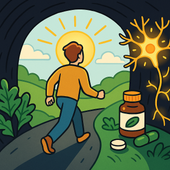
Post-Traumatic Growth and Supplements That Support It
After trauma, true healing means more than survival — it’s transformation. Learn how post-traumatic growth happens in the brain and body, and explore natural supplements like magnesium, ashwagandha, saffron, and omega-3s that support resilience, clarity, and emotional repair.
-
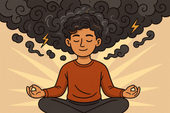
How to Regain Focus After Emotional Stress
After emotional stress, your nervous system feels frayed — your focus fades, thoughts race, and calm seems impossible. Learn how to restore balance, rebuild concentration, and retrain your brain for clarity and peace through evidence-based mind–body tools. 🌿
-
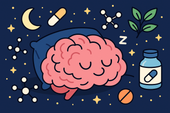
Emerging Research on Sleep and Nootropics
Can nootropics help you sleep better? Discover how compounds like L-theanine, magnesium threonate, ashwagandha, and Alpha-GPC influence neurotransmitters, circadian rhythm, and brain recovery — bridging the gap between smarter days and deeper nights. 🌙
-

New Herbal Extracts for Deep Sleep
Discover the next generation of herbal extracts for deep sleep — from saffron and magnolia to jujube and lemon balm. Learn how these plant-based compounds calm the nervous system, balance cortisol, and promote truly restorative rest. 🌙
-
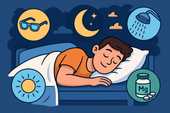
Sleep Biohacking: What Works and What Doesn’t
Biohacking your sleep can sound futuristic — from red light therapy to wearables and supplement stacks. But which hacks actually help, and which are just hype? Discover the science-backed sleep strategies that truly improve rest, recovery, and brain health. 🌙
-
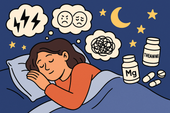
Sleep Support for People with Anxiety Disorders
💭 A restless mind can keep you up all night — thoughts spinning, heart racing, and peace feeling far away. Learn how to quiet overthinking, regulate your nervous system, and create a nightly ritual that teaches your brain to let go and rest deeply. 🌙
-
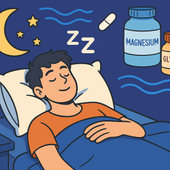
How to Fall Back Asleep After Waking Up
Waking up in the middle of the night? Learn how to fall back asleep quickly and calmly using breathing techniques, stress-reducing rituals, and natural supplements like magnesium and glycine. Restore your body’s rhythm and wake up feeling refreshed.
-
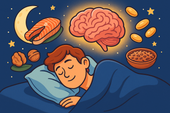
The Role of Omega-3s in Sleep Quality
-
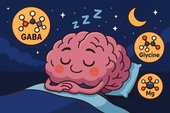
Stacking GABA and Glycine for Deeper Rest
Discover how stacking GABA and glycine can help you achieve deeper, more restorative sleep. Learn how these calming amino acids work together to relax your mind, soothe your body, and improve overall sleep quality—naturally and safely.
-

Overcoming Jet Lag with Supplements
✈️ Jet lag doesn’t have to ruin your trip! Discover how supplements like melatonin, magnesium, L-theanine, and tart cherry can help you reset your body clock faster, reduce fatigue, and recover energy naturally after long flights. 🌙
-

Managing Sleep During Times of Stress
Feeling wired and restless? Learn how to manage sleep during stressful times through nutrition, breathwork, and natural supplements like magnesium and L-theanine. Discover how to calm your nervous system and restore deep, peaceful rest—even when life feels overwhelming.
-

The Role of Magnesium for Night Cramps
Night cramps keeping you awake? Discover how magnesium helps relax muscles, balance electrolytes, and prevent painful spasms. Learn which forms work best, how to take them, and how to pair them with other nutrients for cramp-free, peaceful sleep.
-

Supplements That Reduce Nighttime Awakenings
🌙 Discover science-backed supplements that help you stay asleep through the night. From magnesium and L-theanine to glycine and ashwagandha, learn how these natural compounds calm your nervous system, balance cortisol, and prevent 2 a.m. wake-ups for deeper, more restorative rest.
-

Nootropics That Promote Calm and Rest
Explore the world of calming nootropics — natural brain enhancers that promote relaxation, better focus, and deeper rest. Learn how L-Theanine, magnesium, ashwagandha, and other adaptogens help balance your nervous system, reduce stress, and support restorative sleep.
-

Best Natural Supplement Stack for Sleep
Discover the best natural supplement stack for deep, restorative sleep. Learn how nutrients like magnesium, L-theanine, glycine, and calming herbs such as chamomile and ashwagandha work together to relax your body, calm your mind, and improve sleep quality—naturally and safely.
-

Combining L-Theanine and Magnesium for Sleep: A Calm Night, Naturally
Discover how combining L-Theanine and Magnesium can help you drift into deep, restorative sleep. Learn how this natural duo calms the mind, relaxes the body, and supports your nervous system—without grogginess the next morning.
-

How to Sleep Better After Intense Workouts
Struggling to fall asleep after a tough workout? Learn how to optimize your post-training recovery with nutrition, hydration, and science-backed sleep strategies. Discover how to calm your nervous system, balance hormones, and wake up fully recharged for your next session.
-

Ashwagandha and Valerian: A Bedtime Combo for Deep Rest and Emotional Reset
Discover the calming synergy of Ashwagandha and Valerian root, two natural sleep aids that help quiet the mind, ease anxiety, and promote deeper rest. Learn how this herbal duo supports the nervous system, balances stress hormones, and restores emotional peace — without next-day grogginess.
-

How to Create a Resilience-Boosting Diet
Discover how to build emotional and physical strength from the inside out with a resilience-boosting diet 🍎. Learn which foods stabilize your mood, how supplements like magnesium and omega-3s strengthen your stress response, and why pairing nutrition with breathwork and therapy creates lasting calm, focus, and vitality 🌿💪.
-

Best Teas and Herbal Blends for Calmness: Nature’s Way to Restore Inner Peace
Ashwagandha, the ancient adaptogenic herb, helps your body find balance during stress. Known as “Indian ginseng,” it supports cortisol regulation, boosts energy, and restores calm clarity. Discover how this powerful root promotes resilience, emotional balance, and steady vitality — one cup at a time. 🌸
-

Parenting and Emotional Strength: How to Raise Children Without Losing Yourself
Empathy is the bridge that connects hearts — the quiet power to understand, feel, and support another’s emotions without judgment. Learn how empathy strengthens relationships, enhances communication, and cultivates deeper compassion in everyday life. 🌿
-

How to Bounce Back from Public Failure: Reclaiming Confidence, Purpose, and Power
Visualization is more than imagination — it’s brain training for resilience. By picturing calm, success, or healing, you activate the same neural pathways as real experience. Learn how daily visualization rewires your brain for confidence, emotional balance, and recovery from stress. ✨
-

Coping with Financial Stress Through Resilience: How to Stay Grounded When Money Feels Tight
Body awareness is the foundation of emotional resilience. By tuning into your body’s signals — tension, fatigue, or calm — you learn to recognize stress before it overwhelms you. Discover how mindfulness, gentle movement, and breathwork can deepen your connection with your body and restore balance from the inside out. 🧘
-

How to Stay Positive During Chronic Illness: A Guide to Emotional Strength and Hope
Creativity is more than art — it’s a form of healing. Whether through painting, writing, music, or small acts of expression, creativity helps release emotion, calm the nervous system, and reconnect you to joy. Discover how to use creativity as a tool for emotional balance, resilience, and self-discovery. 🌿
-

Resilience Tips for Caregivers: How to Stay Strong While Caring for Others
Joy isn’t the absence of pain — it’s the quiet strength to find light even in challenging times. Cultivating joy through small daily moments restores balance, releases stress, and reminds you of life’s beauty. Learn how to reconnect with authentic happiness, rebuild emotional energy, and nurture your nervous system through gratitude, presence, and play. 🌿
-

Building Resilience After a Breakup: How to Heal, Rebuild, and Rise Stronger
Social connection is one of the strongest predictors of emotional resilience. During difficult times, genuine relationships act as anchors — calming the nervous system, reducing stress hormones, and helping you regain perspective. Learn how cultivating real human connection can strengthen your mind, heart, and overall well-being. 🌿
-

How to Stay Emotionally Strong During Job Loss
Your emotions are powered by brain chemistry — a delicate balance of neurotransmitters like serotonin, dopamine, and cortisol. When these chemicals work in harmony, you feel calm, focused, and resilient. Learn how daily habits, nutrition, and mindfulness can support your brain chemistry and boost emotional well-being naturally. 🌿
-

The Role of Hormones in Emotional Stability: How Your Chemistry Shapes Your Calm
Hormones shape more than your body — they shape your emotions, resilience, and sense of calm. From cortisol to serotonin, these chemical messengers influence how you react to stress, connect with others, and recover from challenges. Learn how to balance your hormones naturally to build lasting emotional stability and harmony within. 💫
-

Mitochondria and Emotional Energy: The Cellular Power Behind Your Mood
Breathwork is one of the most powerful tools for emotional regulation and cellular balance. Through intentional breathing, you can calm your nervous system, increase oxygen flow to the brain, and even support mitochondrial energy. Learn how conscious breathing connects body and mind — transforming stress into presence and emotional strength. 🌿
-

Inflammation and Its Impact on Mood Resilience: The Silent Link Between Body and Mind
Inflammation doesn’t just affect the body — it impacts the mind. Chronic inflammation alters brain chemistry, depletes serotonin, and makes emotional recovery harder. Learn how calming inflammation through nutrition, mindfulness, and sleep can restore balance, resilience, and a renewed sense of emotional strength. 💫
-

How Antioxidants Protect Emotional Well-being: The Hidden Link Between Oxidative Stress and Mental Health
Antioxidants do more than protect your body — they defend your mind. By neutralizing oxidative stress, antioxidants support serotonin, dopamine, and brain energy pathways that keep you calm, focused, and emotionally balanced. Discover how foods like berries, green tea, and dark chocolate nourish your brain, boost mood, and strengthen resilience from the inside out. 🌿✨
-

The HPA Axis and Emotional Health: The Hidden Bridge Between Stress and Mind
Neuroplasticity — the brain’s ability to rewire and adapt — is the foundation of emotional healing and resilience. When you face stress, trauma, or change, your neural pathways can reshape themselves to support new patterns of calm, focus, and self-awareness. Learn how daily practices like mindfulness, therapy, and breathwork strengthen neuroplasticity to transform emotional pain into personal growth. 🌸
-

Why Cortisol Control Is Key to Resilience: Mastering Stress to Build Emotional Strength
Controlling cortisol — the body’s main stress hormone — is the secret to lasting resilience. When cortisol levels stay balanced, your mind becomes clearer, emotions steadier, and energy more sustainable. Learn how breathwork, mindset shifts, adaptogens, and daily rhythms can help you calm your stress response and build true inner strength. 🌞💪
-

Dopamine’s Influence on Motivation and Recovery: Reigniting Drive and Balance
Healthy relationships are the foundation of emotional balance and resilience. Whether romantic, familial, or platonic, genuine connection releases dopamine, serotonin, and oxytocin — the brain’s “bonding trio” — helping us feel secure, motivated, and seen. Learn how trust, empathy, and communication not only strengthen your connections but also reshape your nervous system for deeper emotional well-being. 🌿🤝
-

The Role of Serotonin in Resilience: How This “Mood Molecule” Shapes Emotional Strength
Serotonin — often called the “resilience molecule” — plays a vital role in how we handle stress, regulate mood, and recover from emotional challenges. Beyond happiness, this powerful neurotransmitter helps balance the gut-brain axis, stabilize the nervous system, and support emotional flexibility. Learn how nutrition, sunlight, mindfulness, and adaptogens can naturally boost serotonin and strengthen your emotional resilience. 🌞🧠
-

How Neuroplasticity Supports Emotional Growth: Rewiring the Brain for Resilience
Neuroplasticity is the brain’s built-in power to grow, adapt, and heal — and it’s the foundation of emotional transformation. Every mindful breath, compassionate act, or reframed thought strengthens new neural pathways that support resilience and self-awareness. Learn how your brain rewires through daily habits, helping you turn emotional challenges into opportunities for growth and calm. 🌿
-

Tai Chi and Adaptogens for Mind-Body Balance: The Art of Harmonizing Energy and Resilience
Alchemy isn’t just an ancient science — it’s a timeless symbol of transformation and inner balance. By blending the physical and spiritual, alchemy teaches us that change begins from within. Just as metals are refined into gold, we too can transmute emotional pain, stress, and chaos into clarity and strength through mindful practice and self-awareness. 🌙✨
-

Cold Therapy and Emotional Control: Training the Mind Through the Body
Cold therapy isn’t just for athletes — it’s a tool for emotional mastery. By exposing your body to controlled cold, you train your nervous system to stay calm under stress, improving focus, mood, and resilience. This article explores the science of cold exposure, its impact on hormones and the vagus nerve, and how ice baths and cold showers can help you build emotional control, one breath at a time. 🧊🧘♂️
-

How Music Influences Emotional Recovery: The Healing Soundtrack of the Mind
Neuroplasticity — the brain’s ability to rewire and heal itself — is at the heart of emotional recovery. Through mindful habits, music, therapy, and consistent mental stimulation, your brain can form new connections that support resilience and well-being. Discover how neuroplasticity turns pain into growth, helping you rebuild balance, focus, and emotional strength. 🌿
-

Nature Therapy for Building Resilience: Reconnecting With the Healing Power of the Earth
Nature therapy helps rebuild emotional resilience by reconnecting you with the healing rhythms of the Earth. From forest walks to sunlight exposure, nature restores balance to your nervous system, lowers stress hormones, and teaches emotional adaptability. Learn how spending time outdoors can enhance mental clarity, calm anxiety, and awaken your natural capacity to heal. 🌞
-

Breathwork Techniques That Pair with Supplements: The Ultimate Synergy for Stress Relief and Mental Clarity
Breathwork and supplements create a powerful mind-body synergy for stress relief, focus, and energy. By combining intentional breathing with adaptogens, nootropics, and calming nutrients, you can naturally regulate cortisol, sharpen mental clarity, and boost emotional balance. This guide explores the best breathwork techniques and supplement pairings to help you feel centered, calm, and energized from the inside out. 🌿

















































